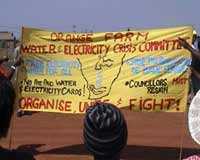Orange Farm
| Orange Farm | |
|---|---|
 Orange Farm | |
|
Location within Greater Johannesburg  Orange Farm | |
| Coordinates: 26°27′54″S 27°51′25″E / 26.465°S 27.857°ECoordinates: 26°27′54″S 27°51′25″E / 26.465°S 27.857°E | |
| Country | South Africa |
| Province | Gauteng |
| Municipality | City of Johannesburg |
| Area[1] | |
| • Total | 12.16 km2 (4.70 sq mi) |
| Population (2011)[1] | |
| • Total | 76,767 |
| • Density | 6,300/km2 (16,000/sq mi) |
| Racial makeup (2011)[1] | |
| • Black African | 99.3% |
| • Coloured | 0.3% |
| • Indian/Asian | 0.1% |
| • White | 0.1% |
| • Other | 0.2% |
| First languages (2011)[1] | |
| • Zulu | 44.5% |
| • Sotho | 29.1% |
| • Xhosa | 9.5% |
| • Tsonga | 4.1% |
| • Other | 12.8% |
| Postal code (street) | 1841 |
| PO box | 1805 |

Orange Farm (Farma) is a township located approximately 45 km from Johannesburg, Gauteng Province, South Africa. It is one of the youngest informal settlements in South Africa, with the original inhabitants; laid off farm workers, taking up residency in 1988. Support for the population came slowly mostly from people who were tenants at the great township of Soweto.
The settlement now includes a modern library, few paved roads, permanent housing for some, electricity in places, a clinic, an information center with internet access, and a multi-purpose community center and franchise supermarkets (Pick 'n Pay and Shoprite). However these improvements come with financial costs, which most of the citizens living in Orange Farm cannot afford. The ongoing privatisation which Orange Farm has been subjected to has also drawn much criticism from social justice and human rights groups as local businesses keep on dying. Most people are still living in Shacks. The streets are full of dongas and when it rains the streets become muddy making it impossible for cars to pass. Most notably the installment of pre-paid water meters has been criticised for denying access to clean drinking water for much of the population of Orange Farm.
The recently founded Orange Farm Water Crisis Committee, an off-shoot of the South African Anti-Privatisation Forum (AFP) has been very vocal and active against the privatisation of water. Approximately 85% of the people work in Johannesburg. Most of the people use train to get to work. 40% of the residents are unemployed and the stats rise every year as the matriculants join them.
References
- ↑ 1.0 1.1 1.2 1.3 "Main Place Orange Farm". Census 2011.
External links
- Media report: AFP activist shot dead in her home
- Media report: Orange Farm residents continue protest...
- Online Documentary: Orange Farm Water Crisis, 2004